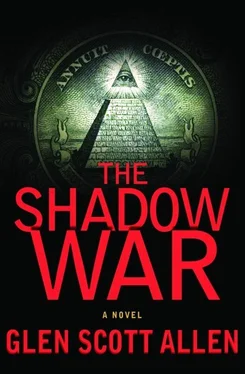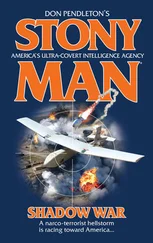Glen Allen - The shadow war
Здесь есть возможность читать онлайн «Glen Allen - The shadow war» весь текст электронной книги совершенно бесплатно (целиком полную версию без сокращений). В некоторых случаях можно слушать аудио, скачать через торрент в формате fb2 и присутствует краткое содержание. Жанр: Триллер, на английском языке. Описание произведения, (предисловие) а так же отзывы посетителей доступны на портале библиотеки ЛибКат.
- Название:The shadow war
- Автор:
- Жанр:
- Год:неизвестен
- ISBN:нет данных
- Рейтинг книги:5 / 5. Голосов: 1
-
Избранное:Добавить в избранное
- Отзывы:
-
Ваша оценка:
- 100
- 1
- 2
- 3
- 4
- 5
The shadow war: краткое содержание, описание и аннотация
Предлагаем к чтению аннотацию, описание, краткое содержание или предисловие (зависит от того, что написал сам автор книги «The shadow war»). Если вы не нашли необходимую информацию о книге — напишите в комментариях, мы постараемся отыскать её.
The shadow war — читать онлайн бесплатно полную книгу (весь текст) целиком
Ниже представлен текст книги, разбитый по страницам. Система сохранения места последней прочитанной страницы, позволяет с удобством читать онлайн бесплатно книгу «The shadow war», без необходимости каждый раз заново искать на чём Вы остановились. Поставьте закладку, и сможете в любой момент перейти на страницу, на которой закончили чтение.
Интервал:
Закладка:
"What has that game got to do with Dr. Fletcher's research on nuclear war?"
"Let me answer the second question first." Wolfe pulled the chair over to the table. He took the bottle of scotch, studied it as if contemplating another drink, then set it with some finality on the table.
"You heard Herman Kahn mentioned at dinner." Benjamin nodded. "Cavendish was right, Kahn practically did invent theorizing about nuclear war. He worked out dozens of scenarios: What if the Soviets strike first? What if we do? What if they use only half their missiles in such a strike? Every conceivable variation of mass death. He was the one who argued that, however horrific the idea might be, it was better to come out of such a war with twenty million dead than a hundred and fifty million dead."
"You're right," said Benjamin. "It does sound horrific."
"He called it 'thinking the unthinkable.' " Wolfe pointed at the computer. "Kahn didn't really bring this level of sophistication to bear on such thinking. That came with computer wizards like Fletcher. And, in his day, Arthur Terrill." He saw Benjamin's look of surprise. "Yes, in his early days, Arthur was quite the whiz kid of Armageddon."
"But he said he knew nothing about Jeremy's research."
"Apparently Arthur's also become adept at an administrator's most useful skill: lying."
"But how do you understand this stuff?"
"I told you I recognized the name Anton Sikorsky from Fletcher's list?" Benjamin nodded. "Well, Anton and I worked together, some years ago, for the Foundation. On this 'stuff.' Not at Fletcher's level. His whole career had been devoted to examining Kahn's scenarios, the assumptions behind them, and subjecting them to rigorous statistical analysis. To establishing the probabilities of such unthinkable events."
Benjamin turned, walked to the bed, but didn't sit down. Suddenly he turned.
"You mean his program calculates the probability of the Cold War?"
"Yes."
Benjamin laughed. "But isn't that like predicting rain after a flood?"
"Not quite." Wolfe knitted his eyebrows. "From what I've been able to understand of Fletcher's work, he simply didn't believe it."
"Believe it?" asked Benjamin, confused. "How can you not believe in the Cold War?"
"It's more about questioning the fundamental logic of the MAD doctrine-Mutual Assured Destruction-that supposedly kept the Cold War from turning hot. He doesn't come right out and say so, but he seems to imply that, at least statistically, it simply doesn't make sense. Or put in Fletcher's terms, that it has a high probability of such a doctrine being unstable. And if I'm reading this right, the TEACUP program is calculating that probability at 80 percent."
Before Benjamin could say anything, Wolfe moved the pointer on the screen and slowly dragged the window with the graphs aside, so that the list of files underneath it was now visible. "And I would assume this is the list of his data points from which to calculate that probability."
Benjamin stepped closer, leaned down over Wolfe's shoulder.
There were three columns of file names. On the right, Benjamin recognized a number of books about King Philip's War. In the middle was a single file name: "Gadenhower Data." And on the left was a list of titles he didn't recognize, but they were clearly all about nuclear war: The Effects of Global Thermonuclear War, Thinking About the Unthinkable, The Fallacies of Cold War Deterrence… and a long list of journal articles and white papers.
Benjamin saw that each of the titles had a little X in front of its name… or so he thought until Wolfe suddenly placed his hand on Benjamin's arm.
"Look there," said Wolfe, pointing to the bottom of the list.
"Bainbridge Data," said the bottommost file name on the left. And there was no little X before its name. "And there," said Wolfe, pointing to the last entry in the column on the right.
Stzenariy 55, it read.
"Well, here goes," said Wolfe. He clicked on the "Bainbridge Data" file, and it opened… to reveal nothing.
"Obviously he hadn't gotten that data yet," Wolfe said.
"But he had the Ginsburg book, we know that," protested Benjamin.
"Then 'Bainbridge Data' must refer to some other information about the good Reverend," Wolfe said, sounding frustrated.
Benjamin thought for a moment. "Like his diary," he said.
"Diary?" asked Wolfe impatiently.
"Something Dr. Stoltz told me about at dinner. It's an amazing story. I can't understand why my father never mentioned it, as it surely would have been referenced-"
"Benjamin!"
"Yes, sorry. Anyway, according to Stoltz they discovered something he called the Bainbridge diary here, on the grounds of the Foundation, back in the 1920s."
"And Stoltz told Fletcher about this discovery?"
"Yes. He said Jeremy came to speak to him about the mural in the foyer, but that he was also very interested in anything about Bainbridge, including this diary."
"Then why is the file empty?"
"Because the diary isn't here. Not anymore. It was donated to the Morris Estate."
"The Seaton Morris Estate?" Wolfe asked.
"Stoltz didn't say," Benjamin said. Then he thought of something. "But there's a stamp in the Ginsburg book that identifies it as part of the Seymour Morris library."
"Do tell." Wolfe turned back to the screen. "Well, let's see if this other file is more revealing."
He clicked on the " Stzenariy 55 " file. And when it opened, it did indeed contain something more. But only three words.
Borba s tenyu.
CHAPTER 16
Once again, Benjamin found himself driving through the wooded hills of Massachusetts. The good weather had given way to a typically overcast New England fall day and, though it wasn't raining yet, the threat of a downpour lurked in the low clouds overhead.
Benjamin and Wolfe were headed for the Morris Estate, not far from the Foundation's campus, for a hastily arranged interview with one Seaton Morris: son of the late tycoon, philanthropist, and bibliophile Seymour Morris, now guardian of the original Bainbridge diary-and wealthy benefactor of the American Heritage Foundation.
"On a Sunday?"
"Arthur implied the Morris family owes the Foundation a favor, or many favors," Wolfe said. "But he suggested we arrive no later than ten o'clock. Apparently they're hosting a charity art auction this afternoon, and they want our little tour group out before then."
So, still groggy from too little sleep and too much wine, brandy, and scotch, Benjamin had followed Wolfe outside. He'd noticed Wolfe was carrying his briefcase, and when he'd asked, Wolfe had told him yes, Fletcher's laptop was inside, as he no longer felt Fletcher's room was a "secure site." But he hadn't explained why.
Soon the narrow road was again bordered by rows of maple and sycamore trees, with the occasional paved driveways leading up to stately, isolated mansions. As they drove, they discussed the files they'd discovered the night before on Fletcher's computer.
"I recognized most of the ones about nuclear strategy," Wolfe said, "but not the one titled Stzenariy 55. Which I translate as 'Script 55.' Which means nothing to me."
"And that Russian phrase that was inside?"
"Borba s tenyu?" said Wolfe. "Not a clue."
"Well, I was paying attention to those other files, from the Colonial period," Benjamin said. "Did you notice the one called 'Newburgh Data'?"
"No. Why, does it mean something to you?"
"Well…" Benjamin hesitated. "I believe it refers to the Newburgh Conspiracy."
"Who was Newburgh?" asked Wolfe.
"It's not a who, it's a where. Newburgh, New York, where the Continental Army was camped at the end of the Revolutionary War. And actually it's not really an accurate name, as their camp was closer to New Windsor, and-"
Читать дальшеИнтервал:
Закладка:
Похожие книги на «The shadow war»
Представляем Вашему вниманию похожие книги на «The shadow war» списком для выбора. Мы отобрали схожую по названию и смыслу литературу в надежде предоставить читателям больше вариантов отыскать новые, интересные, ещё непрочитанные произведения.
Обсуждение, отзывы о книге «The shadow war» и просто собственные мнения читателей. Оставьте ваши комментарии, напишите, что Вы думаете о произведении, его смысле или главных героях. Укажите что конкретно понравилось, а что нет, и почему Вы так считаете.












